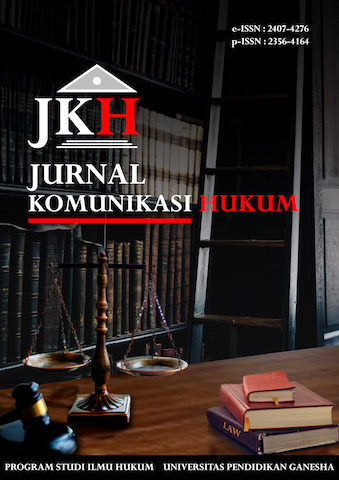ANALISIS IMPLEMENTASI GADAI TANAH PERTANIAN MENURUT UNDANG-UNDANG NOMOR 56 PRP TAHUN 1960 (STUDI DI KABUPATEN PONOROGO)
DOI:
https://doi.org/10.23887/jkh.v8i2.49735Abstract
This study analyzes and examines the implementation of agricultural land pawning according to Law Number 56 PRP of 1960 in order to examine whether it has been effective or not in Ponorogo Regency. This research is included in the descriptive empirical research. Sources of data and types in this study are primary and secondary data. The approach applied in this research is a conceptual approach, a statutory approach and a sociological approach. The location chosen by the researcher for this research is Ponorogo Regency. Data collection techniques used are interviews and document and literature studies. The data analysis applied in this study was carried out qualitatively or descriptively. Looking at the development of the research carried out, the researcher can conclude that the implementation of pawning agricultural land in Ponorogo Regency has not been in accordance with Law Number 56 PRP of 1960. This happened because the people in Ponorogo Regency, which in general are rural communities, more often use customary law or customary law. verbal agreement on the implementation of the agricultural land pawn agreement because it is considered more efficient and easier in its implementation. So that the role of the government and the community is needed so that land pawn regulations can be effective, especially in Ponorogo Regency
Downloads
Published
How to Cite
Issue
Section
License
Authors who publish with this journal agree to the following terms:- Authors retain copyright and grant the journal right of first publication with the work simultaneously licensed under a Creative Commons Attribution License that allows others to share the work with an acknowledgement of the work's authorship and initial publication in this journal.
- Authors are able to enter into separate, additional contractual arrangements for the non-exclusive distribution of the journal's published version of the work (e.g., post it to an institutional repository or publish it in a book), with an acknowledgement of its initial publication in this journal.
- Authors are permitted and encouraged to post their work online (e.g., in institutional repositories or on their website) prior to and during the submission process, as it can lead to productive exchanges, as well as earlier and greater citation of published work (See The Effect of Open Access).
Authors who publish with this journal agree to the following terms:
- Authors retain copyright and grant the journal right of first publication, with the work [SPECIFY PERIOD OF TIME] after publication simultaneously licensed under aCreative Commons Attribution License that allows others to share the work with an acknowledgement of the work's authorship and initial publication in this journal.
- Authors are able to enter into separate, additional contractual arrangements for the non-exclusive distribution of the journal's published version of the work (e.g., post it to an institutional repository or publish it in a book), with an acknowledgement of its initial publication in this journal.
- Authors are permitted and encouraged to post their work online (e.g., in institutional repositories or on their website) prior to and during the submission process, as it can lead to productive exchanges, as well as earlier and greater citation of published work (See The Effect of Open Access).












